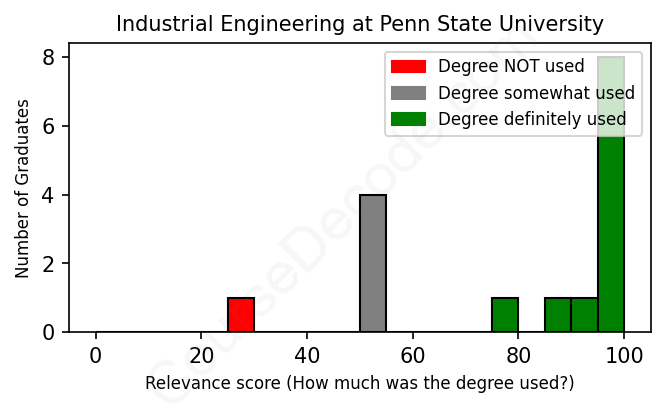
First, some facts. Of the Industrial Engineering graduates from Penn State University we've analyzed , here's how many have used (or NOT used) their degree in their career:

These are estimates based on AI analysis of 16 LinkedIn profiles (see below).
The verdict? Significantly above average. Overall, with an average relevance score of 79%, Industrial Engineering graduates from Penn State University have a much higher likelihood (+12%) of finding work in this field compared to the average graduate across all fields:
And for comparison, here's the chart for all profiles we've looked at across all degrees.
Also, after graduating, only 12% of these graduates have pursued further education other than another Bachelor's degree (such as a Masters degree or other), compared to the average across all profiles of 35%. This suggests a Bachelors degree is enough for most Industrial Engineering graduates, and it's normal to look for work straight after graduation.
See the details:
|
Relevance score: 94% We think this person has gone into a career highly relevant to their degree. We think this person has gone into a career highly relevant to their degree.
DEGREE INFOGraduated in 2020 from Penn State University with a Bachelor's degree in Industrial Engineering. Also pursued further education since (see below). JOB HISTORY SINCE GRADUATIONCapstone Project Consultant PlayWorld Systems Jan 2020 - May 2020 Strategy & Transactions Associate at EY  EY Feb 2022 - Aug 2023 Strategy & Transactions Senior Associate at EY  EY Aug 2023 - Present FURTHER DEGREES DONE SINCE GRADUATINGMaster of ManagementPenn State University 2020 - 2021 ABOUTNo information provided. |
The top 10 most common jobs done by the graduates we've analyzed (ranked most common to least) are:
Taking a look at the job titles from Penn State Industrial Engineering grads, it's clear there's a mix of roles out there. A lot of them, like Manufacturing Engineers, Plant Managers, and Industrial Engineers, do stick closely to the skills learned during their degree, focusing on process optimization, efficiency, and production management. These jobs are a good fit because they require analytical skills and engineering principles, which are what these grads trained for. Other roles, however, seem to stray from the core of industrial engineering. Positions like Shift Managers or Sales Associates are more about customer service and operational management rather than engineering. So, you’d see that while many graduates land jobs that make good use of their degree, there’s a significant portion that get into roles that aren’t strictly about industrial engineering.
In general, graduates are finding their way into both direct engineering roles and more operational or managerial positions. While many of the jobs are definitely related and leverage engineering principles, there are also plenty of roles that seem to be a bit of a stretch when it comes to using that specific skill set. It's kind of a mixed bag — some people are right on track with their industrial engineering backgrounds while others are applying their skills in ways that don’t directly match their education. It just goes to show that a degree in industrial engineering can open many doors, even if some of those doors lead to unexpected paths.
Here is a visual representation of the most common words in job titles for Industrial Engineering graduates (this is across all Industrial Engineering graduates we've analyzed, not just those who went to Penn State University):

Looking at the career trajectories of Industrial Engineering graduates from Penn State University, it seems that many of them find solid footing in relevant fields soon after graduating. For example, a lot of graduates land their first jobs in roles like manufacturing or industrial engineering, project management, or engineering support positions. Even those who took a detour into roles like sales associates or warehouse management generally transitioned back into more specialized engineering roles later, indicating that their foundational skills are often applicable across various industries.
Fast forward five to ten years, and many grads seem to have scaled the ladder quite nicely. Positions like plant managers, vice presidents of operations, and logistics engineers show a clear trend towards leadership roles—not just in traditional manufacturing but also in more strategic areas like consulting and operations management. While there are a few cases of individuals shifting into unrelated fields or taking on roles outside engineering, the majority appear to have maintained a strong connection to their Industrial Engineering roots, building successful and fulfilling careers that leverage their degree. Overall, it looks like a degree from Penn State in this field opens many doors and leads to decent career advancement opportunities.
Getting a Bachelor’s degree in Industrial Engineering at Penn State can be a pretty intense ride, honestly. It's known to be a solid program that covers a lot of ground, like math, statistics, and systems design. Some students find the courses challenging because they require both analytical skills and a good amount of applied problem-solving. That said, it’s not impossible! With the right mindset and time management, a lot of students make it through just fine. It might feel a bit tougher than some other degrees out there, but if you’re really interested in the field and stay on top of your work, you’ll be able to handle it.
Most commonly, in the LinkedIn profiles we've looked at, it takes people 4 years to finish a Bachelor degree in Industrial Engineering.
Taking a look at these Penn State Industrial Engineering graduates, it seems like most of them are doing pretty well in terms of careers and salaries. Those who graduated earlier, like in 2010 and 2012, have progressed from entry-level roles to higher positions, like management, which usually means better pay. For instance, the 2015 grad who climbed to Vice President Operations likely has a nice paycheck. Even the more recent graduates are landing solid job titles, like Manufacturing Program Leader and Senior Associate, which suggests they’re making decent money too. Overall, it looks like a good investment in their education is paying off and they’re making their way up the professional ladder!
Here is a visual representation of the most common words seen in the "about" section of LinkedIn profiles who have a Bachelor degree in Industrial Engineering (this is across all Industrial Engineering graduates we've analyzed, not just those who went to Penn State University). This may or may not be useful:

Here are all colleges offering a Bachelor degree in Industrial Engineering (ordered by the average relevance score of their Industrial Engineering graduates, best to worst) where we have analyzed at least 10 of their graduates:
| College | Score | Count |
|---|---|---|
 Iowa State University Iowa State University
|
88 | 11 |
 North Carolina State University North Carolina State University
|
87 | 12 |
 California Polytechnic State University-San Luis Obispo California Polytechnic State University-San Luis Obispo
|
87 | 15 |
 Texas A&M University Texas A&M University
|
83 | 39 |
 Purdue University Purdue University
|
81 | 36 |
 University of Central Florida University of Central Florida
|
80 | 23 |
 Georgia Institute of Technology Georgia Institute of Technology
|
80 | 59 |
 Penn State University Penn State University
|
79 | 16 |
 Texas Tech University Texas Tech University
|
79 | 10 |
 University of Pittsburgh University of Pittsburgh
|
79 | 15 |
 University of Washington University of Washington
|
78 | 12 |
 University of Arkansas University of Arkansas
|
78 | 11 |
 University of Wisconsin-Madison University of Wisconsin-Madison
|
76 | 13 |
 University of Illinois at Urbana-Champaign University of Illinois at Urbana-Champaign
|
73 | 15 |
 West Virginia University West Virginia University
|
71 | 19 |
 Clemson University Clemson University
|
69 | 23 |
 University of Florida University of Florida
|
64 | 11 |